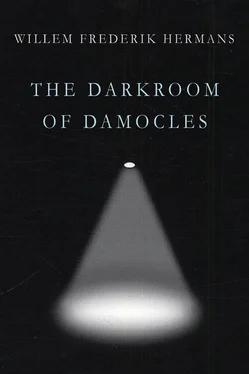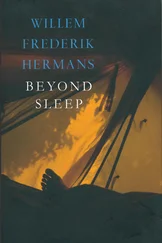The warder returned with an upholstered chair for the visitor to sit on, after which he went away, locking the door behind him.
‘Has my letter been sent on?’ asked Osewoudt.
‘Sent on? Do you really expect us to forward letters written by people like you to the queen? What did you think? That a Resistance fighter in a German concentration camp could write to Hitler and complain about his situation?’
‘I can tell,’ said Osewoudt, ‘that you have never been a prisoner of the Germans. No, not you. But I have. The Germans kept me in prison for nine whole months. They beat me about the face — look, you can see the scar. And may I add that I wouldn’t dream of comparing the queen to Hitler.’
‘I did not come here to listen to your quibbles, but because we are subjects of a state where the rule of law prevails. There can, however, be no question of passing on your letter to Her Majesty. What’s all this nonsense about your fiancée having been killed by the Germans? To our knowledge, you were married to Maria Roelofje Nauta on 25 August, 1939. Your wife was found dead in her tobacco shop in Voorschoten on 6 April. You were not divorced from her. How can you have had a fiancée?’
‘Oh,’ said Osewoudt, ‘was my wife found dead in Voorschoten on 6 April?’
‘Don’t change the subject! I am referring to your so-called fiancée. How dare you mention such a relationship in a letter to the queen?’
‘Should I have written “my mistress”, then?’
‘You should not have written at all. You are doing yourself no service behaving so impertinently. I have some news for you: you are to be returned to the Netherlands in a day or two, and will then learn all the charges that have been made against you. The list of crimes is appalling!’
‘Can you tell me how my wife died?’
The gentleman cast an eye over his papers.
‘No, it doesn’t say.’
‘My wife denounced me to the Germans; does it say anything about that?’
‘No.’
‘She was living with the son of one of the neighbours, a Nazi. Doesn’t it say anything about that either?’
‘No, no mention of that either. Besides, it is no concern of mine. I only came here to explain to you that the sort of letter you wrote does not qualify for consideration. You are entitled to information concerning such a decision, but that is all you are entitled to.’
He put his papers into his briefcase and rose to his feet.
Osewoudt, too, rose and took a step towards his visitor. The man’s eyes widened with fear and the briefcase almost slid from under his elbow.
‘Keep your hands off me!’ he shouted. ‘Don’t do anything foolish now. Where’s the alarm bell?’
‘I have no intention of laying a finger on you! Look, I’m putting my hands in my pockets. But you know as well as I do that without Dorbeck the truth will never come out. Where is Dorbeck? Why has Dorbeck not been traced? Surely there is something you could to do help? You could put pressure on the British to get a statement from Dorbeck! I’ve done nothing wrong. I’ve been behind bars for months on end. In the meantime Holland has been liberated, the war has ended and I’m stuck here. I want to cooperate in every possible way with every possible enquiry. But isn’t there some way you can get me out of here?’
The door opened. Like a shadow, the gentleman slipped past the warder and was gone.
The torpedo-catcher’s siren blasted three times in succession, shrill and piercing like a bird of prey. The wild pulsations of the propeller-shaft casing, which extended down the middle of the steel compartment, travelled on through all the surrounding steel. Then silence. The tin water bottle hanging on the wall no longer swung to and fro. The electric light went out for a moment, then glowed again, but at no more than half strength. The deep throbbing that had filled Osewoudt’s ears for he knew not how long did not come back. A diesel engine rumbled in a remote part of the vessel.
Osewoudt wiped his sticky hands on each other, and swallowed. Then he took a gulp of stale water from the tin bottle and replaced it on its hook. Footsteps. More footsteps. Finally footsteps becoming very loud then stopping abruptly. The rattle of keys against the steel hatch.
Two military policemen in khaki burst in. ‘You’re coming with us, Osewoudt,’ they said, and put a black sack over his head.
He followed them through the steel innards of the vessel, a pair of handcuffs dangling from each wrist. Peering down his nose, he caught a glimpse of daylight. Underfoot steel plates gave way to steel gratings. Then up some stairs: wooden steps edged with strips of brass. The air he inhaled became cooler and fresher. He glimpsed a wooden floor, then wood with raised bars across it. A sagging sensation at the knees told him that this was a downward ramp. They stepped on to a paved surface, and finally he caught the smell of a car.
‘Watch it! Up the ladder!’ said the policeman on his left.
He went up the ladder. A door was slammed. The handcuffs were removed from his left wrist, then his hands were fastened behind his back with the remaining pair. Finally they pulled the sack off his head and left without a word.
He was sitting on a wooden bench in the back of some kind of prison van. There was an air vent in the roof and a small barred side window of frosted glass.
He heard the engine start up, felt the vehicle drive off. He had lost track of time, but noticed that it was getting dark.
‘Where am I?’ he asked when he was let out of the van.
‘In Drente. Camp Eighth Exloërmond.’
It was long after sunset. The open air smelled of rotten eggs. He could make out a few soldiers standing about, armed with Sten guns. He saw a high barbed-wire fence glaringly lit by sodium lamps. That was all he got to see before they hustled him into a building, down a passage and into a room.
The desk was piled high with files. A man with black hair slicked down from a central parting, a high forehead and slack, lined cheeks, pointed to a straight-backed wooden chair and said: ‘Sit down, Osewoudt. I am Inspector Selderhorst. Let’s begin by reviewing your case from A to Z. It’s a complete shambles.’
He waved at the stack of files.
‘No one can make sense of it any more. I want to give you every chance to justify yourself.’
‘So what do you want to know?’
‘There’s that business with the photos to start with. How did you get them?’
‘It was that day in May 1940 when the Germans invaded. Dorbeck turned up in my tobacco shop. I had a notice in my window saying that films could be left with me for developing and printing. Dorbeck gave me a film and said he’d be back to pick it up.’
‘And did he come back?’
‘No. It wasn’t until much later, in 1944, that I got a note from him saying I should send them to a post-office box in The Hague. PO Box 234, it was. So that’s what I did.’
‘How do you know the photos arrived?’
‘I posted them early and then went to The Hague myself later that afternoon. I kept watch by the post-office boxes.’
‘Why did you do that?’
‘I was hoping to speak to Dorbeck.’
‘And did you?’
‘No. A Salvation Army woman came to open the box. I went after her to find out who she was, but when I went out into the street she had vanished. The next day I went back to the same post office, hoping someone would show. No one did. Not the following days either. Later that evening I received a phone call from Elly Berkelbach Sprenkel. I met her at the yellow-tram terminal in Voorburg. She had one of the photos with her to prove her identity. She said it had been given to her in England. I found that hard to believe, as she had arrived from England the previous night and there could hardly have been time for the picture to get there before she left. But I did believe, and rightly as it turned out, that she had come from England. So I assumed she must have got the picture in Holland but didn’t want to tell me who had given it to her. I never did find out who it was. I never had an opportunity to ask Dorbeck, either.’
Читать дальше












